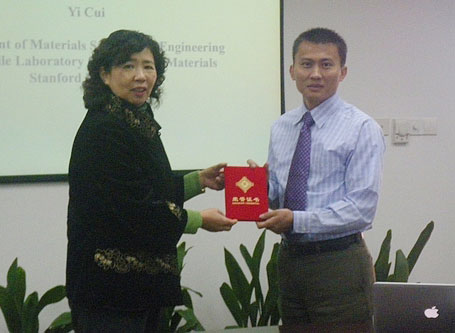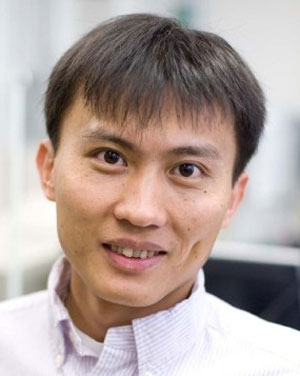Battery startup Amprius has raised $25 million to commercialize founder Yi Cui’s breakthrough in using silicon nano-wires to boost the efficiency of lithium-ion batteries.
The funding source includes Google CEO Eric Schmidt and venture capital firm Kleiner Perkins Caulfield & Byers, VantagePoint Venture Partners, Stanford University, Trident Capital and Chinese funds IPV Capital and Qian Neng Fund.
Stanford Associate Professor Yi Cui has developed a battery cathode (the side of the battery that stores the positive charge) that uses silicon nano-wires to store up to 10 times the density of lithium ions as the carbon cathodes commonly used in even the most advanced lithium-ion batteries. The breakthrough has improved battery energy density up to 40% on the scale used in portable electronic devices like smartphones.
 Yi Cui (right) visited China’s Suzhou Institute of Nano-Tech and Nano-Bionics of the Chinese Academy of Sciences in January of 2011.
Yi Cui (right) visited China’s Suzhou Institute of Nano-Tech and Nano-Bionics of the Chinese Academy of Sciences in January of 2011.
Cui hopes to scale up the concept to the far larger batteries used to power electric cars. Success there would give Amprius a virtually unlimited market since, for the forseeable future, batteries make up half the cost of electric cars and their cost and capacity are the limiting factors in their popularization. At the moment the battery industry coaxes out about a 2% efficiency improvement each year from lithium-ion batteries.
“Our recent fundraising will enable us to deploy our first commercial product, validate our manufacturing processes, and launch a global presence,” said Amprius CEO Kang Sun, a 20-year tech venture veteran.
Amprius was founded in 2008 by Yi Cui, a superstar associate professor and researcher at Stanford University. His breakthroughs in devising ways to configure functioning devices on the nano scale attracted a $10 million grant from Saudi Arabia’s King Abdullah University of Science and Technology (KAUST). That grant is currently funding Cui’s sizeable Stanford research group focused on nanoscale phenomena for energy conversion, electronics, and nanobiotechnolog. His group has developed nanowire and nanocrystal materials for energy storage, solar cell and memory devices.
Cui was the first person to demonstrate nanowire field effect biosensors. He has published 32 research papers related to nanowires and nanocrystals. He has presented his work in over 70 invited talks at conferences, universities, and research centers around the world. Among his inventions is a process for turning clothing into a battery by dying fabric with a solutioin containing carbon nanotubes.
Yi Cui graduated from China’s University of Science and Technology in 1998. He moved to the U.S. to study at Harvard and obtained his PhD in chemistry there in 2002. He completed a two-year postdoctoral research project on electronics and colloidal nanocrystals at the University of California, Berkeley from 2003 to 2005. He then joined the Stanford University faculty as an assistant professor in the department of materials science and engineering. In 2010 he was elevated to the status of an associate professor. In 2011 was was appointed to the Photon Science Faculty at the SLAC National Accelerator Laboratory.


